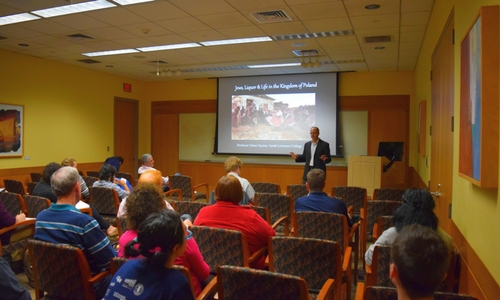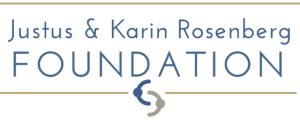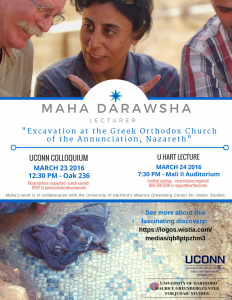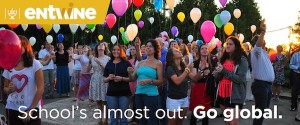By Jillian Chambers
UConn Hillel, the Center for Judaic Studies and Contemporary Jewish Life, and the UNESCO Chair and Institute for Comparative Human Rights were honored to host Director Michael King and Executive Producer Joyce Mandell of the award-winning film The Rescuers. The film was screened for the audience, followed by a question and answer session with King and Mandell.
The film chronicles the journey of Stephanie Nyombayire, a young Rwandan anti-genocide activist, and Sir Martin Gilbert, a leading Holocaust historian, as they travel across Europe and elsewhere interviewing survivors and descendants of the diplomats who rescued thousands of Jews from the Nazis. The film explores the connection between the Holocaust and other genocides, such as in Darfur.
One story featured in the documentary was that of Aristides de Sousa Mendes, a French diplomat who worked himself into physical exhaustion processing visas for Jewish refugees attempting to enter Spain. Additionally, Sousa Mendes was able to have the fees associated with documentation waived, which allowed more Jewish refugees the opportunity to come to Spain. Sousa Mendas was recognized by Israel as one of the Righteous Among the Nations in 1966, the first diplomat to be honored in this way.
The documentary also followed Georg Ferdinand Duckwitz, an attaché for the Nazis. Upon finding out that Danish Jews were to be deported, Duckwitz coordinated with the Swedish prime minister to take in 95 percent of Jews in Denmark, totaling over 7,900 people. Similar to Sousa Mendas, he was named Righteous Among the Nations by Israel in 1971.
The film viewing was followed by a talkback with King and Mandell. King commented on how Stephanie’s story was important to tell. “She shows that genocide is still happening,” said King.
One audience member asked what motivated King to direct the film. King replied, “I was teaching in Florida when Joyce called me about the exhibit on Ellis Island about the diplomats. She told me how impactful it was. We discussed it and I did some research and I realized it was a wonderful story.”
We thank Joyce Mandell and Michael King and all those who came out to this event!
 The Center for Judaic Studies hosted Professor Glenn Dynner of Sarah Lawrence College on October 20. He presented his talk, “Jews, Liquor, and Life in Eastern Europe” to an enthusiastic audience in the Class of 1947 Room in the Homer Babbidge Library. Dynner showed how Eastern Europe became a safe haven for Jews in the 1800s and how changes in social dynamics later forced them out.
The Center for Judaic Studies hosted Professor Glenn Dynner of Sarah Lawrence College on October 20. He presented his talk, “Jews, Liquor, and Life in Eastern Europe” to an enthusiastic audience in the Class of 1947 Room in the Homer Babbidge Library. Dynner showed how Eastern Europe became a safe haven for Jews in the 1800s and how changes in social dynamics later forced them out.

